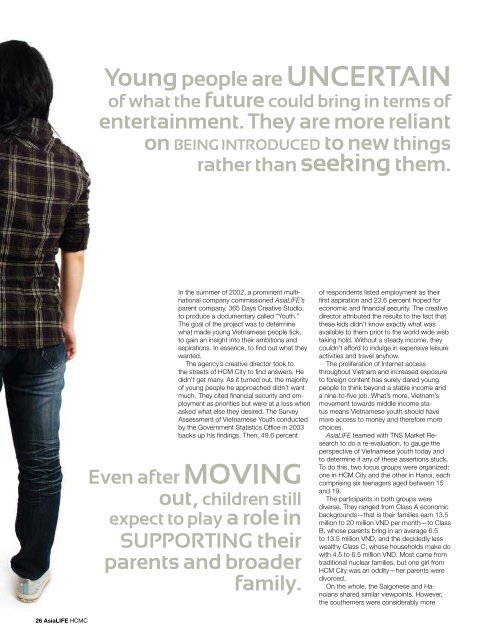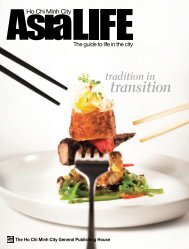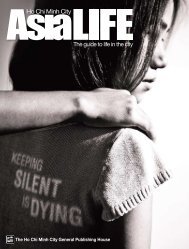Brett Davis - AsiaLIFE Magazine
Brett Davis - AsiaLIFE Magazine
Brett Davis - AsiaLIFE Magazine
Create successful ePaper yourself
Turn your PDF publications into a flip-book with our unique Google optimized e-Paper software.
Young people are UNCERTAIN<br />
of what the future could bring in terms of<br />
entertainment. They are more reliant<br />
on BEING INTRODUCED to new things<br />
rather than seeking them.<br />
The family unit in Vietnam is central<br />
to DAILY LIFE and the core from which<br />
a broader sense of COMMUNITY<br />
responsibility is derived.<br />
In the summer of 2002, a prominent multinational<br />
company commissioned <strong>AsiaLIFE</strong>’s<br />
parent company, 365 Days Creative Studio,<br />
to produce a documentary called “Youth.”<br />
The goal of the project was to determine<br />
what made young Vietnamese people tick,<br />
to gain an insight into their ambitions and<br />
aspirations. In essence, to find out what they<br />
wanted.<br />
The agency’s creative director took to<br />
the streets of HCM City to find answers. He<br />
didn’t get many. As it turned out, the majority<br />
of young people he approached didn’t want<br />
much. They cited financial security and employment<br />
as priorities but were at a loss when<br />
asked what else they desired. The Survey<br />
Assessment of Vietnamese Youth conducted<br />
by the Government Statistics Office in 2003<br />
backs up his findings. Then, 49.6 percent<br />
Even after MOVING<br />
out, children still<br />
expect to play a role in<br />
SUPPORTING their<br />
parents and broader<br />
family.<br />
of respondents listed employment as their<br />
first aspiration and 23.6 percent hoped for<br />
economic and financial security. The creative<br />
director attributed the results to the fact that<br />
these kids didn’t know exactly what was<br />
available to them prior to the world wide web<br />
taking hold. Without a steady income, they<br />
couldn’t afford to indulge in expensive leisure<br />
activities and travel anyhow.<br />
The proliferation of Internet access<br />
throughout Vietnam and increased exposure<br />
to foreign content has surely dared young<br />
people to think beyond a stable income and<br />
a nine-to-five job. What’s more, Vietnam’s<br />
movement towards middle income status<br />
means Vietnamese youth should have<br />
more access to money and therefore more<br />
choices.<br />
<strong>AsiaLIFE</strong> teamed with TNS Market Research<br />
to do a re-evaluation, to gauge the<br />
perspective of Vietnamese youth today and<br />
to determine if any of these assertions stuck.<br />
To do this, two focus groups were organized:<br />
one in HCM City and the other in Hanoi, each<br />
comprising six teenagers aged between 15<br />
and 19.<br />
The participants in both groups were<br />
diverse. They ranged from Class A economic<br />
backgrounds—that is their families earn 13.5<br />
million to 20 million VND per month—to Class<br />
B, whose parents bring in an average 6.5<br />
to 13.5 million VND, and the decidedly less<br />
wealthy Class C, whose households make do<br />
with 4.5 to 6.5 million VND. Most came from<br />
traditional nuclear families, but one girl from<br />
HCM City was an oddity—her parents were<br />
divorced.<br />
On the whole, the Saigonese and Hanoians<br />
shared similar viewpoints. However,<br />
the southerners were considerably more<br />
open about some topics—namely sex and<br />
relationships—than their conservative northern<br />
peers. Regardless, each member brought<br />
interesting and relevant ideas to the table.<br />
And, with a population that reached 85.8<br />
million last year, of which the United Nations<br />
estimates more than half are under the age<br />
of 25, understanding Vietnamese youth has<br />
never been more important.<br />
FAMILY<br />
Familial ties run deep in Vietnam and the<br />
results from both focus groups reflected this.<br />
Without exception, each of the participants<br />
feels obligated to “repay” their parents—for<br />
housing, educating and feeding them—by<br />
supporting them financially later in life. Many<br />
of the respondents, especially the girls, even<br />
felt the need to acquire a part-time job in<br />
addition to their studies to ease financial<br />
pressure on their parents.<br />
While the sense of familial responsibility is<br />
overwhelmingly apparent, the boys especially<br />
also yearn for independence and wish to live<br />
outside the family home as adults. Dung, an<br />
18-year-old boy from HCM City talked about<br />
his home where he lives with his extended<br />
family. He mentioned that living in such<br />
close quarters led to frequent and heated<br />
arguments between family members, adding<br />
that privacy was difficult to come by. He said<br />
that if he came home late he ran the risk of<br />
disrupting his family and getting in trouble.<br />
Moving out, he said, would give him more<br />
freedom.<br />
The girls were far more dependent on their<br />
parents, but most said they would probably<br />
move in with their husbands’ family after marriage.<br />
Loc, a 16-year-old high school student,<br />
cited her fear of ghosts as her primary reason<br />
for staying at home until then. “If I move out I<br />
fancy I can die,” she said.<br />
There’s a real tug-of-war taking place.<br />
Young Vietnamese are split between traditional<br />
family loyalty and a desire for independence<br />
and freedom. Many spoke about moving<br />
into their own home after marriage and<br />
raising their own families, rather than living<br />
in a multi-generational household. Still, they<br />
appreciate the advantages of living at home,<br />
too, where responsibilities like household<br />
chores are limited and they can focus on their<br />
studies without worrying about money.<br />
LEISURE<br />
An average Vietnamese teenager’s idea of<br />
fun may seem boring to a Western audience.<br />
Think: lounging in cafes with friends, watching<br />
TV, riding motorbikes through the city and<br />
predominantly, surfing the Internet and playing<br />
online games. A couple of the boys play<br />
football, but primarily the recreational pursuits<br />
the participants in both the HCM City and<br />
Hanoi focus groups take part in are passive.<br />
Income (or lack thereof) largely dictates what<br />
Vietnamese teenagers do in their free time,<br />
explaining the simplicity (and affordability) of<br />
their chosen leisure activities.<br />
Travel is on the agenda for most of the<br />
Hanoians, while the HCM City residents are<br />
fairly content where they are. Two girls from<br />
the Saigon group expressed interest in travel<br />
(one to Thailand, whose “beautiful” beaches<br />
she has seen on TV, and the other to Singapore<br />
where her grandma has encouraged her<br />
to attend university once she’s completed<br />
high school). The rest though seemed fairly<br />
uninterested. The Hanoians all want to travel,<br />
some to outbound destinations like England<br />
(to watch football), South Korea and America.<br />
26 asialife HCMC asialife HCMC 27















